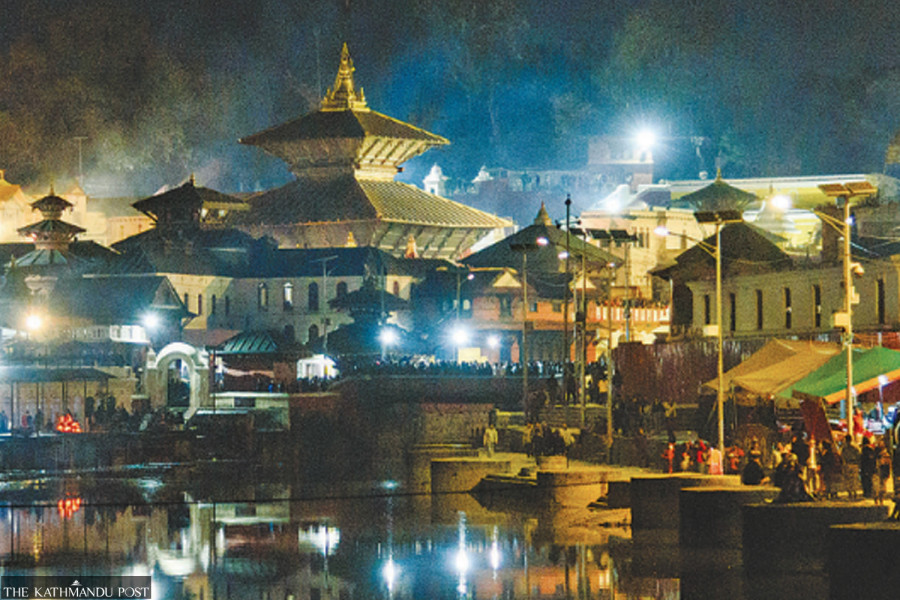National
Court orders Pashupati Trust to relocate burial site from Sleshmantak jungle
A division bench passes a strongly worded verdict as the state agencies failed to honour a similar ruling from 2016.
Binod Ghimire
The Supreme Court has directed the government, the Pashupati Area Development Trust and the authorities concerned to strictly avoid any activities that undermine the religious, cultural and spiritual significance and ecology of the Pashupati area.
Issuing a full text of the January verdict on Friday, the top court has banned the use of concrete in the construction within the Unesco World Heritage site, to stop the burial of the dead bodies in the Shleshmantak forest area and to allow no road passage through the area.
A division bench of justices Ishwar Prasad Khatiwada and Nahakul Subedi has passed a strongly worded verdict following the reluctance of the state agencies to abide by a similar ruling from the court in 2016.
As per the verdict, the graveyard in Shleshmantak forest near the Pashupati Temple must be relocated within a year at most, ensuring that no dead bodies are buried in the area after that. Different communities, mainly Christians and Kirat, have long been burying their dead in the forest area though that is not regular.
“Some communities have been using the forest area as their graveyard though that is not so frequent these days. We will study the court order and make needful decisions in coordination with other government entities,” Raju Kumar Khatri, member secretary at the Trust, told the Post. "We need land to relocate the graveyard. The trust cannot do it alone, it needs the government's support."
The court has also asked the authorities not to open motorable tracks through one of the world’s most decorated Hindu shrines and close it if one already exists. Only foot trails can be constructed there if necessary, it said.
In 2007, the trust opened a 675-metre roadway alongside the Shleshmantak jungle—from Tilganga to Tamarganga—to manage traffic congestion between Tilganga and Chabahil. Locals, environmentalists, and cultural activists had voiced concerns that the road section was causing soil erosion and disturbing the natural habitat of the historic forest near the Pashupatinath temple. Even Unesco had asked the trust to block the road immediately.
In 2016, a division bench of justices Aanand Mohan Bhattarai and Anil Kumar Sinha ordered the authorities not to operate the road. The court administration inspected the road before the ruling was issued. Responding to a writ petition filed by advocate Tulashi Simkhada in 2014, the court asked the state agencies to be mindful of the sensitivity of world heritage sites.
As the court order continued to be violated, advocate Deepak Bikram Mishra moved the court demanding its intervention against the activities that are threatening to damage a historic site that has deep religious, cultural and historical importance.
The new order has imposed a complete ban on the use of concrete in the construction and to preserve the religious, cultural, archaeological and ecological significance of the area. The court has further sought surety that the originality of the heritage site is maintained while carrying out any construction or reconstruction work. “Plant trees in the Bankali, Mrigasthali and Shleshmantak area to maintain greenery in the sacred place,” reads a point of the ruling.
Expressing serious concern over the increasing incidents of landslides in the area, the court directed immediate measures to control them. The petitioner sought the court’s ruling to preserve the vegetation, claiming the area was gradually losing greenery, which added to the risk of rain-induced disaster.
Through the ruling, Khatiwada and Subedi also directed the trust to keep a proper record of the assets under the Pashupati Guthi [trust] and to maintain a transparent record of income and expenditure. Financial transparency has always been an issue in Pashupati.
Having taken notice of the non-implementation of the previous order, the top court has directed the Judgement Implementation Directorate to regularly monitor whether the order has been implemented and to keep records if any authorities and officials refuse to abide by it. It has asked for periodic report submissions to the court, showing the implementation status and naming the official and agency, for action, if they were reluctant to comply.
“I have seen the order but haven’t received it officially from the court,” said Khatri. “We respect the order and are ready for its implementation, by preparing a necessary plan.”




 9.7°C Kathmandu
9.7°C Kathmandu














